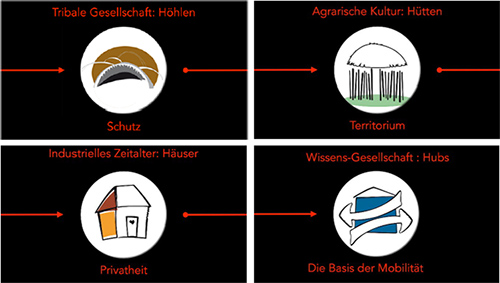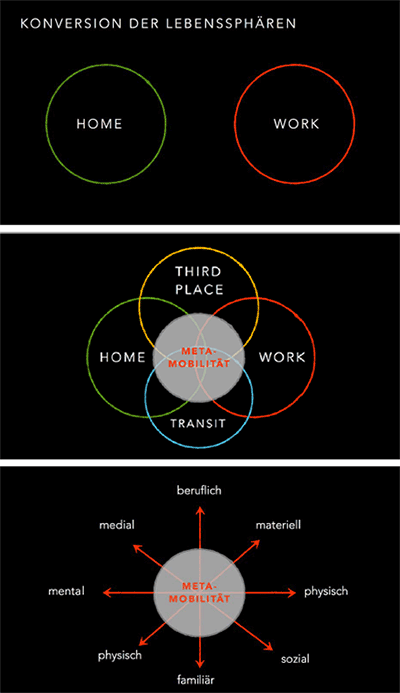How is our definition of HOME evolving?
The poet Robert Frost once wrote that “home is the place where, when you have to go there, they have to take you in.” Interestingly we often ask people “where do you live? or “where are you from?”, but much less often, “where do you feel at home?” as it is generally assumed that where you live or where you are from, is where you feel at home. But in our individualistic and seemingly hyper mobile multi-cultural society it is not always the case that you feel at home where you came from, or where you happen to be living.
Historically the function of what could be classed as home has evolved enormously. Once upon a time when we lived in caves we were looking primarily for shelter. The agrarian society of hut living brought territory into the equation, and the industrial age brought about the conscious creation of home as a sanctuary. In today’s knowledge society, home is a hub, essentially providing a base for mobility – both mental and physical – which means that the demands upon it and the definition of home is far more complex today than it has ever been. So how can we create better living situations for the future if we cannot easily define what makes a home a home? Is home today a space, a place or a feeling? Is it where your “castle” is in the physical sense, or is a virtual castle in the realm of the technological kingdom? In fact do we even need a fixed single place to call home? Can we perhaps define it as the place (or places) that we have a deep longing for – that feeling which we normally define as a homesickness?
Psychiatrist Professor Michael Lehofer points out that people who suffer the most homesickness are, contrary to what we might instinctively believe, the ones that have the least bonding to a place, who don’t have a strong sense of a home. If are are bonded to a place or a people and have a strong idea of where home is, you will not get so homesick when you are away from it because you have the inner security and sense of that place that you take with you. You are free to explore.

What then are the implications for a digital mobile society where people connect through virtual rather than physical space?
The German philosopher and cultural theorist Peter Sloterdijk in an interesting interview (with himself) touches on many of the tricky philosophical issues surrounding our definition of space and home. In his paper Spheres Theory, Taking to Myself about the Poetics of Space, he says that it is important to speak of space “because humans are themselves an effect of the space they create.” He believes that human evolution can only be understood if we bear in mind the mystery of insulation/island making. If in this case, we take this to mean our homes, then we can also, as he states, see “humans are pets that have domesticated themselves in the incubators of early culture.”

We have effectively evolved from a simple dualistic system of simple work/home to, in Sloterdijlks language, a complex system of spheres. So what kind of spheres or spaces are we as “pets” creating to incubate in? As a basis for mobility our physical home (typically a flat or house) is just one of our spaces that define us. We also today define ourselves increasingly through our work and hence our workspace, also our choice of third spaces, but also our means of transportation or mobility (the fourth sphere). The philosopher and writer Alain de Botton pointed out in The Architecture of Happiness that our lives have changed so much in just a few generations that “our homes do not have to offer us permanent occupancy or store our clothes to merit the name. Home can be an airport or a library, a garden or a motorway diner.”
Sloterdijk regards humans as “animals who like to move, who change rooms, space, indeed even the element in which they live.” Over millennia, we have evolved from being nomads to “technomads”. Today instead of our taking our chattels with us, we carry our virtual home with us in the form of a smartphone, computer or tablet. The Romanian philosopher Mircea Eliade believes home has two dimensions – the vertical and horizontal. The vertical plane has heaven, or the upper world, at one end. The horizontal plane is the traffic of this world, moving to and fro. He believes that mental health and emotional continuity do not require us to stay in the same place, but they do require a sturdy structure on the inside – and that structure is built in part by what has happened on the outside. The inside and outside of our lives are each the shell where we learn to live. It is not therefore surprising that in an individualistic society, we are moving towards finding a new stronger shell in the regeneration of the neighbourhood and a big trend towards co-living and a sharing economy.
Furthermore in a world of multi-biographical lives, patchwork families, refugees, economic migrants, couples living apart together, increasing amounts of singles and the growing silver society, the shell or the sphere that we call home will in the future have to be nothing less than a multi-functional flexible base for meta-mobility that works in several dimensions. Whether real or virtual, mobile or fixed, home as Eliade says “is much more than shelter; home is our center of gravity.”
Bibliography:
- Spheres Theory, Taking to Myself about the Poetics of Space, Peter Sloterdijk, Harvard Design Magazine, Number 30, Spring/Summer 2009
- Alain de Botton pointed, The Architecture of Happiness
- Micea Eliade, from Why Be Happy When You Could Be Normal by Jeanette Winterson
Hinweis:
Gerne dürfen Sie diesen Text nachdrucken oder zitieren.
Wir bitten um Mitteilung an m.nemeth@zukunftsinstitut.de
